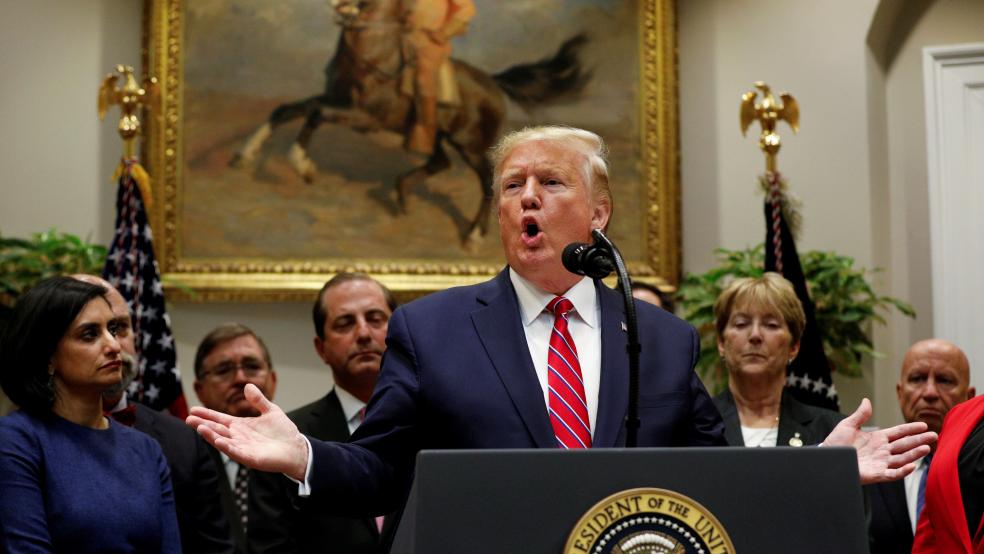The Trump administration on Friday released the final version of a rule forcing hospitals to publicly disclose the prices they negotiate privately with insurers or face fines. The rule, which would take effect in 2021, is intended to improve transparency in a system that officials say in now clear as mud, increasing competition and better enabling consumers to shop for hundreds of medical items and services, including procedures like X-rays and lab tests, doctor care and facility fees.
The administration already requires hospitals to publish list prices, but the new rule would go further by requiring hospitals to post prices paid by various insurers, prices for out-of-network care and charges for patients paying in cash.
The administration also proposed a second rule requiring insurers to allow patients to get estimates of their out-of-pocket costs before they receive care.
“President Trump has promised American patients 'A+' healthcare transparency, but right now our system probably deserves an F on transparency, " Health and Human Services Secretary Alex Azar said in a statement. "Today's transparency announcement may be a more significant change to American healthcare markets than any other single thing we've done, by shining light on the costs of our shadowy system and finally putting the American patient in control.”
Will this kind of transparency work? “Administration officials, employers and others have criticized hospitals and insurers for keeping the deals they strike a secret, making it challenging for patients to seek less expensive places to get care,” writes New York Times reporter Reed Abelson. “They argue that by making it easier for people to find the actual prices that insurers pay — and not just the standard list prices for various services, which the Trump administration started requiring hospitals to post earlier this year — hospitals will be under more pressure to compete on prices.” Implementing the changes is likely to cost hospitals less than 1% of their revenue, an administration official said according to CNBC.
But health-care experts say it’s not clear whether hospital price transparency will actually lead to lower prices for patients, and some warn there’s a chance that increased transparency will backfire, resulting in some lower cost hospitals raising prices when they see what others charge. The proposed rule for insurers says that, “while the Departments are of the view that the overall effect of this proposal would lower health care costs, the Departments recognize that price transparency may have the opposite effect because in some markets where pricing is very transparent, pricing can narrow and average costs can increase.”
The plan doesn’t have much bite: “While the Trump administration's new hospital price transparency requirement is quite sweeping, the enforcement of it is quite weak -- a maximum fine of $300 per day,” said Larry Levitt of the Kaiser Family Foundation, a nonprofit focused on health care. “The technical term for that is ‘chump change.’ I wonder how many hospitals will just pay the fine.” New York Times health care reporter Sarah Kliff noted that the daily fines work out to a maximum of $109,500 a year. “To put that in perspective: at some hospitals, they can make up that revenue with five MRI scans,” she said in a tweet.
Levitt added that the proposal requiring insurers to disclose how much their enrollees would owe for medical services may be much more meaningful to patients.
Hospitals and insurers will fight back: Both industries object to having to disclose what they see as proprietary information. America’s Health Insurance Plans, an industry group, criticized the rules in a statement Friday and four major hospital organizations — the American Hospital Association (AHA), Association of American Medical Colleges (AAMC), Children’s Hospital Association (CHA) and Federation of American Hospitals (FAH) — quickly promised to challenge the administration in court.
“Instead of helping patients know their out-of-pocket costs, this rule will introduce widespread confusion, accelerate anticompetitive behavior among health insurers, and stymie innovations in value-based care delivery,” the groups said in a joint statement. “Because the final rule does not achieve the goal of providing patients with out-of-pocket cost information, and instead threatens to confuse patients, our four organizations will soon join with member hospitals to file a legal challenge to the rule on grounds including that it exceeds the Administration’s authority.”





